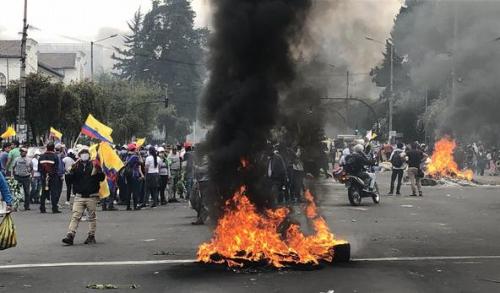Latin America up in flames
Latin America, to a great extent, has been penetrated as never before by US policy and the adjustments of its financial arm, the IMF.
- Análisis

“Chile in a state of emergency, Ecuador in a state of siege, Colombia in a humanitarian crisis, Peru in a political crisis, Brazil paralyzed, Argentina destroyed, Paraguay exhausted, Latin America up in flames”. Seven countries of South America subjected to structural adjustments of the International Monetary Fund (IMF) have succumbed to political chaos. At the present time, they are governed by terror or hunger. In the rest of Latin America, the situation is the same or worse. Haiti is torn apart, Honduras destroyed, Guatemala living its tragedy, El Salvador under terror and Mexico trying to free itself from its chains.
Latin America, to a great extent, has been penetrated as never before by US policy and the adjustments of its financial arm, the IMF. The IMF adjustments are the same in every country of the region. They begin with an initial arm-twisting, eliminating or reducing public spending. The application of “shock” treatment follows, privatizing all public assets, savings of workers accumulated over decades, with just a few decrees. The next step is “flexibilising” the relations between workers and business owners that significantly reduces wages.
The application of adjustments is undertaken by “strong” regimes. They have to convince the workers, for better or worse, that their sacrifice is for the good of the country. The repressive measures go in accord with the resistance of the people: Pinochet in Chile, Fujimori in Peru, Salinas de Gotari in Mexico and many others. In Panama, the IMF adjustments favoured the owners of capital in an extraordinary way. In the decade of 1970, 66 per cent of the wealth produced in the country formed part of the mass of wages that workers received. By the beginnings of the XXI Century, the relation had been overturned, 66 per cent of the wealth went to business and only 34 per cent came to workers and their families.
The application of the adjustments is accompanied by empty promises that lull the workers for a time. The most popular promise that the business-controlled governments make is that the concentration of wealth among the richest has limits. The accumulation of wealth will soon fill the glass and will pour down to benefit workers and other sectors that have been impoverished. The promise never becomes a reality. On the contrary, poverty becomes more intolerable and breaks any kind of communication between the rich and the poor, between capitalists and workers.
The XXI century has seen social explosions in the whole region as a consequence of the adjustment policies. In Argentina, they underwent this twice. In Peru and Ecuador as well. In Haiti, there is a permanent State of insurrection and repression. What some might call ‘a catastrophic tie’. At the end of the last century and the beginnings of the present one, the (neo-liberal) adjustment measures showed that they were useless. They enabled the owners of capital to appropriate more wealth, making way for a few persons to have billions of dollars in their possession. But at the same time, tens of millions of workers were cast into the precipice of poverty. The neo-liberal recipe was proven to be unsustainable.
To confront the chaos provoked by the United States and the IMF in Latin America, democratic governments arose known as the “pink tide”. Chávez in Venezuela, Correa in Ecuador, Kirchner in Argentina, Lula in Brazil, Zelaya in Honduras, the governments of the respective Fronts in Nicaragua and El Salvador, which presented governmental programs more favourable to workers. The oligarchies of these countries declared themselves in a state of war. They received the support of what was called “civil society” (upper middle class) and the United States. In many cases, the reaction was successful. In others, the resistance managed to contain the United States (Venezuela, Bolivia) but at a very high cost.
The United States launched out against the watchwords of Chávez, Lula, Kirchner, Evo and Correa, who proclaimed changes and even, in some cases, socialism (Bernie Sanders style). Nevertheless, the IMF rejected the idea of distributing national wealth in a more just way. Recent uprisings in Honduras, Argentina, Ecuador and Chile demonstrate the failure of policies that impoverish the people. The only formula that could be successful for the countries of the region is regional unity. Only as one block can they confront the world powers and their financial instruments.
October 24 2019
(Translated for ALAI by Jordan Bishop)
- Marco A. Gandásegui, Jr, is Professor of Sociology with the University of Panama and Associate Researcher with the Centro de Estudios Latinoamericanos Justo Arosemena (CELA)-
https://marcogandasegui19.blogspot.com/
Del mismo autor
- La pandemia no es el fin del capitalismo 23/04/2020
- Hay que masificar las pruebas contra un virus clasista 19/04/2020
- ¡Qué falta hacen los Comités de Salud de J. Renán Esquivel! 09/04/2020
- La desigualdad social y la desconfianza contribuyen a la epidemia 02/04/2020
- Hacen falta más ‘pruebas’ para ‘suprimir’ el coronavirus 26/03/2020
- La crisis del capitalismo y el coronavirus 19/03/2020
- Urge una movilización general para atacar el corona-virus 12/03/2020
- Se necesita liderazgo y transparencia para enfrentar el corona-virus 05/03/2020
- EEUU veta relaciones entre Panamá y China 27/02/2020
- Roberto Arosemena, sus ideas perduran y sus luchas continúan 20/02/2020
